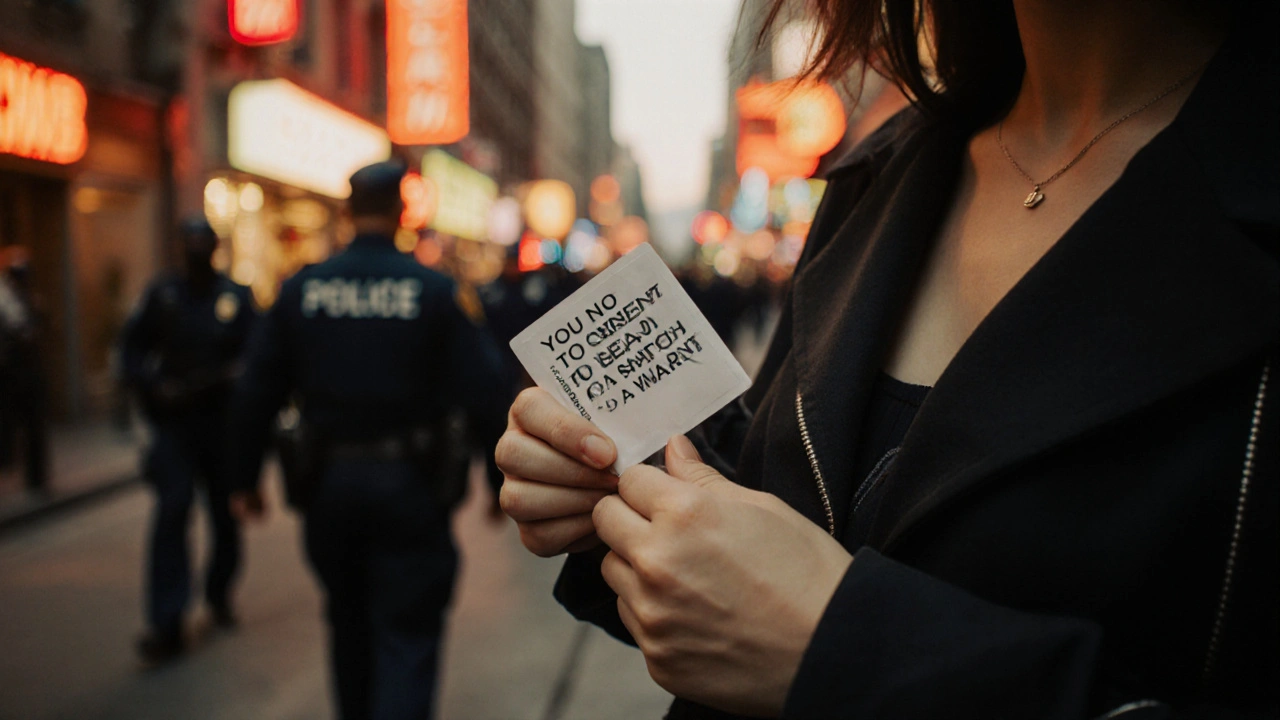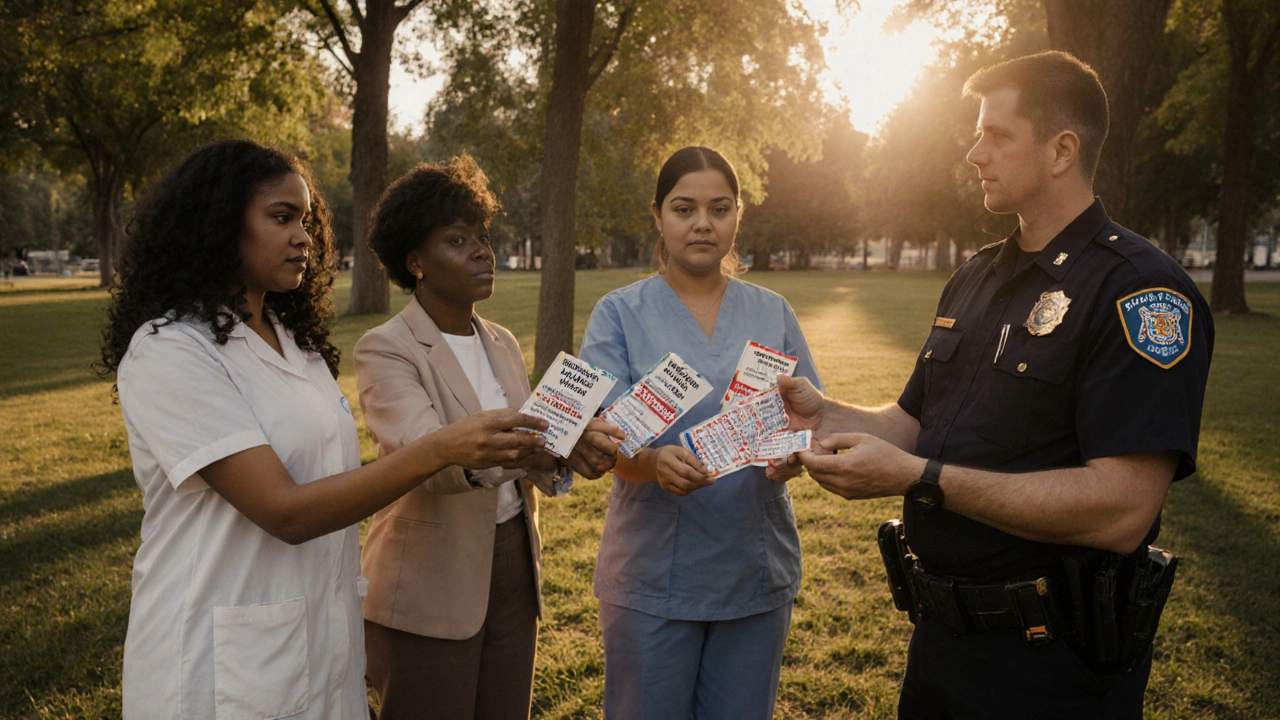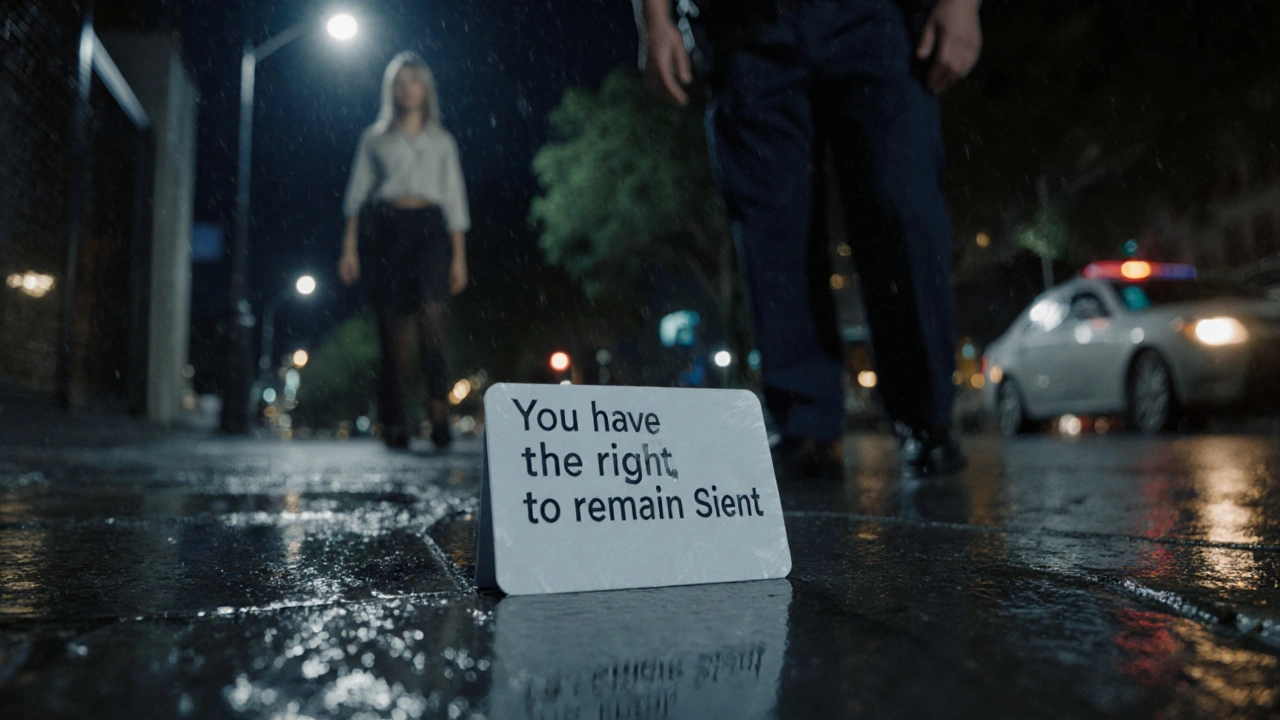Carrying a simple card with your legal rights can change everything if you’re stopped by police, confronted by a hostile client, or arrested during a raid. For sex workers around the world, these cards aren’t just pieces of paper-they’re lifelines. In places where laws are unclear, inconsistently enforced, or actively used to target you, having a clear, concise summary of your rights can mean the difference between walking away safely and being dragged into a system built to silence you.
What’s on a Rights Card?
A rights card for sex workers is a small, laminated card-often the size of a credit card-that lists your legal rights in plain language. It doesn’t try to explain every law. It doesn’t cite statutes. It tells you what you can and cannot do, what police can and cannot do, and what to say when you’re being pressured.
Typical content includes:
- You have the right to remain silent.
- You do not have to consent to a search without a warrant.
- You do not have to show ID unless required by law in your jurisdiction.
- You have the right to ask for a lawyer before answering questions.
- Consensual adult sex work is not a crime in many places-even if it’s unregulated.
- Police cannot arrest you for simply being in a public space or talking to someone.
- You can record police interactions in most countries, as long as you’re not interfering.
These aren’t opinions. They’re based on actual laws in places like New Zealand, parts of Canada, Germany, and some states in Australia. Even where laws are harsher, many of these rights are protected under constitutional or human rights frameworks.
Why a Card? Why Not Just Know the Law?
Knowing the law is one thing. Remembering it under pressure is another.
Imagine this: It’s 2 a.m. You’re standing on the street. A police car pulls up. Two officers get out. One says, "You’re under arrest for loitering." The other says, "Let’s see your ID." Your heart races. Your hands shake. You can’t remember if you need ID in this state. You don’t know if they can search your bag. You’re tired. You’re scared. You say yes to everything.
That’s when the card matters.
It’s not about being smart. It’s about being prepared. You don’t need to memorize every clause of the Criminal Code. You just need to pull out a card that says: "I know my rights. I’m not breaking the law. Let me call my lawyer."
Where Do These Cards Work?
These cards aren’t magic. They won’t stop every abuse. But they’ve been proven to reduce arrests, deter harassment, and give workers leverage.
In New Zealand, where sex work is fully decriminalized, rights cards are distributed by peer organizations. Workers report fewer violent incidents because clients know the law protects the worker. Police are trained to treat sex workers as lawful adults, not targets.
In Canada, even though selling sex is legal, buying it is not. That creates a gray zone. Rights cards clarify: "You can’t arrest me for working. You can’t arrest me for talking to someone. You can’t force me to leave this street." Workers in Vancouver and Toronto use them to push back against "quality of life" sweeps.
In Australia, laws vary by state. In Victoria and New South Wales, sex work is legal and regulated. In Western Australia, where I’m based, it’s partially decriminalized-but police still use minor offenses like "public nuisance" to shut down workers. A rights card here says: "I’m not loitering. I’m not soliciting. I’m not breaking any law. Show me the specific section you’re citing."
Even in places like the U.S., where most states criminalize sex work, cards have helped workers avoid jail. In San Francisco, a group called SWOP (Sex Workers Outreach Project) handed out cards with QR codes linking to legal aid. One worker was arrested for "prostitution"-but showed the officer her card. He paused. Asked for her ID. Then let her go. "I didn’t know you had rights," he said. "I’m sorry."

How to Make Your Own Rights Card
You don’t need a lawyer to make one. You just need accurate info and clarity.
Here’s how to build your own:
- Find your local laws. Search for "sex work laws [your city/state]". Look for government sites, legal aid orgs, or peer-run collectives.
- Write down only what matters: What can police do? What can’t they do? What are you allowed to do?
- Use short sentences. No jargon. No Latin terms. "You don’t have to answer questions" not "You are entitled to invoke your right to silence under Article 14 of the ICCPR."
- Print it on waterproof cardstock. Laminate it. Keep it in your wallet, phone case, or purse.
- Add a 24/7 helpline number. Local sex worker orgs, legal aid, or even a trusted friend who can call for you.
Some groups offer free downloadable templates. If you’re in Australia, check out SWAN (Sex Workers Alliance Network) or Scarlet Alliance. They have versions in English and multiple languages.
What to Do If Police Ignore Your Card
Not everyone will respect it. Some officers will roll their eyes. Others will try to intimidate you. Here’s what to do:
- Stay calm. Raise your voice, and you risk escalation.
- Repeat your rights clearly. "I’m not resisting. I’m not running. I’m exercising my right to remain silent."
- Ask for their name and badge number. Say it out loud: "I’m writing down your name and badge number."
- Record the interaction if you can. Even if you don’t post it, having a recording deters abuse.
- If you’re arrested, say: "I want to speak to a lawyer. I’m not answering any questions until then."
- Afterward, report it. Contact a sex worker org. File a complaint with police oversight. Your voice matters.
One worker in Melbourne was arrested after showing her card. She didn’t fight. She didn’t cry. She repeated: "I’m not breaking any law. I’m asking for my lawyer." She was held for 12 hours. Then released without charge. She filed a complaint. Two months later, the officer was retrained on human rights protocols.
Who Else Uses These Cards?
You’re not alone. Thousands of sex workers around the world carry these cards. They’re used by transgender women in Brazil, migrant workers in Spain, queer men in Thailand, and street-based workers in the UK.
They’re also used by allies. Nurses, social workers, and even some police officers now carry them to hand out. In Berlin, a police officer gave one to a worker during a raid. "I don’t agree with the law," he said. "But I believe in your rights."

Why This Matters Now
Every year, more countries move toward decriminalization. But enforcement lags behind policy. Police still arrest sex workers under vague charges: "public indecency," "disorderly conduct," "loitering with intent."
These charges are often used to control marginalized people-especially women of color, migrants, and trans people. A rights card flips the script. It says: "I’m not hiding. I’m not begging. I’m not asking for permission. I’m here legally, and I know it."
In 2024, a study by the Global Network of Sex Work Projects found that workers who carried rights cards were 62% less likely to be arrested during police encounters. Those who didn’t were twice as likely to be physically assaulted.
This isn’t theory. It’s survival.
Where to Get a Pre-Made Card
If you don’t want to make your own, here are trusted sources:
- Scarlet Alliance (Australia) - Free downloadable cards in English, Arabic, and Thai.
- SWOP USA - Cards for U.S. states, with legal citations.
- Red Umbrella Fund - Cards in over 15 languages, designed for migrant workers.
- Sex Workers’ Rights Advocacy Network (SWRAN) - Cards for Europe and the UK.
Print them. Share them. Carry one. Give one to a coworker. Keep one in your car. Leave one with a friend.
Final Thought
Your body is not a crime. Your work is not a crime. Your right to safety is not a privilege. It’s a human right.
A card won’t fix the law. But it gives you power in the moment when you need it most. It turns fear into clarity. Silence into voice. Helplessness into control.
Make one. Carry it. Share it. You’re not just protecting yourself. You’re protecting everyone who comes after you.
Are sex worker rights cards legal to carry?
Yes. Carrying a card that explains your legal rights is not illegal anywhere. It’s not considered evidence, contraband, or a tool for solicitation. Police cannot confiscate it unless they arrest you for a separate offense. Even then, you have the right to ask for it back. In countries like Australia, Canada, and New Zealand, courts have upheld the right to carry legal information cards as part of free speech and due process.
Can police arrest me for having a rights card?
No. Having a rights card is not a crime. Police cannot arrest you just because you’re carrying one. If they try, you can say: "I’m carrying a legal information card. I’m not breaking any law. If you’re arresting me, please state the charge under section [insert relevant law]." If they still arrest you, it’s likely an abuse of power-and you should report it immediately to a sex worker advocacy group.
What if I’m a migrant worker? Do these cards work for me?
Yes. Many rights cards are designed specifically for migrant workers and include information in multiple languages. In Australia, Scarlet Alliance offers cards in Arabic, Mandarin, Thai, and Vietnamese. These cards clarify that your immigration status doesn’t remove your basic human rights-even if you’re undocumented. You still have the right to remain silent, to refuse a search, and to call a lawyer. Police cannot use your immigration status as grounds for arrest unless you’re violating immigration law, which is a separate process handled by border authorities, not local police.
Can I use a rights card if I’m working online?
Yes. Online sex workers face different risks-like platform bans, payment freezes, or police raids on homes. A rights card can still help if law enforcement shows up at your door. It reminds them that simply having a webcam, a website, or accepting digital payments is not illegal in most places. In Australia, online sex work is legal if you’re over 18 and not coerced. The card can help you assert that you’re not running an illegal business.
Do I need a lawyer to make a rights card?
No. While lawyers can help verify accuracy, you don’t need one to create a basic rights card. Many peer-led organizations have already created legally accurate templates based on local laws. You can download, print, and use them as-is. Just make sure the information matches your jurisdiction. If you’re unsure, contact a sex worker advocacy group-they’ll review your version for free.
What if I’m in a country where sex work is fully illegal?
Even in countries where sex work is criminalized, you still have basic human rights. You still have the right to remain silent, to refuse a search without a warrant, and to ask for a lawyer. A rights card in these places focuses on those universal rights, not on the legality of sex work. It says: "I’m not resisting. I’m not running. I’m not consenting to a search. I want to speak to a lawyer." This can prevent escalation and reduce violence. Many workers in such countries have survived raids and arrests because they used these cards to stay calm and assert their rights.
Can I share my rights card with others?
Yes. Sharing your card is one of the most powerful things you can do. It helps others stay safe. It builds solidarity. Many workers give cards to new colleagues, friends, or even people they meet on the street. Some organizations encourage workers to leave cards in public spaces like libraries, community centers, or bathrooms. Every card you share is one more person who knows their rights-and one less person who gets hurt because they didn’t know.
